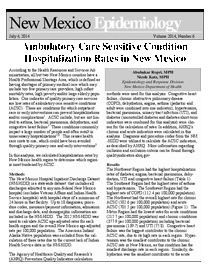High Rates of Preventable Hospitalizations
A New Mexico Department of Health analysis reveals that the Southeast and Northwest regions had the highest hospitalization rates due to Ambulatory Care Sensitive Conditions (ACSC) in 2012 -- conditions for which outpatient care or early interventions can prevent hospitalizations and/or complications. These conditions include, but are not limited to asthma, bacterial pneumonia, dehydration and congestive heart failure.
The top three ACSC age-adjusted rates for hospitalizations in New Mexico during 2012 were:
- Bacterial pneumonia (214.6 per 100,000 population)
- Congestive heart failure (153.3 per 100,000 population)
- Diabetes (116.4 per 100,000 population)

The Northwest region, which consists of Cibola, McKinley and San Juan counties, had the highest rates of diabetes, angina, bacterial pneumonia, dehydration, UTI and congestive heart failure.
The Southeast region, consisting of Chaves, Curry, DeBaca, Eddy, Lea, Lincoln, Roosevelt and Quay counties, had the highest rates of asthma and hypertension.
The Metro region (Bernalillo, Sandoval, Valencia and Torrance counties) has the lowest chronic and acute ACSC rates (377.9 and 215.7 per 100,000 population, respectively).
“There are several things New Mexicans can do to avoid unnecessary hospitalization,” said Department of Health Secretary Retta Ward, MPH. “They can become educated on what it takes to maintain their health, find a doctor they trust and follow their doctor’s recommendations to take better care of themselves.”
Programs have been established in an effort to decrease these preventable hospitalizations such as an asthma education program at Nor Lea General Hospital in Lovington, NM. Supported by the Department of Health’s Asthma Control Program, it provides intensive self-management education primarily to pediatric asthma patients who have poor control over their disease. The education provided consists of instruction on understanding prescribed medications and how to use them properly, how to use an asthma action plan, and how to recognize and avoid asthma triggers. The program has been shown to improve asthma control and reduce emergency health care utilization for patients participating in the program.
The Department also offers the Manage Your Chronic Disease (MyCD) Program, which is a six-week class offered once a week for two and half hours for adults with chronic health conditions. Classes are led by a pair of trained individuals, one or both with health problems of their own. Participants gain the knowledge and skills needed to take a more active role in managing their health. Classes are offered in English and Spanish.
Another program, the National Diabetes Prevention Program (NDPP), is a one-year lifestyle change program for adults with pre-diabetes, or at risk for diabetes. Participants work with a trained lifestyle coach in a group setting to make changes in diet and exercise, lose 5-7 percent of body weight, and maintain a healthy lifestyle. In New Mexico, the Department of Health - Diabetes Prevention and Control Program educates providers about diabetes risk, including education regarding pre-diabetes and how to identify patients at risk, as well as the method of referring patients to the program.
Please see our Ambulatory Care Sensitive Condition Hospitalization Rates in New Mexico publication to learn more about preventable hospitalizations.
Media Contact
We would be happy to provide additional information about this press release. Simply contact David Morgan at 575-528-5197 (Office) or 575-649-0754 (Mobile) with your questions.

